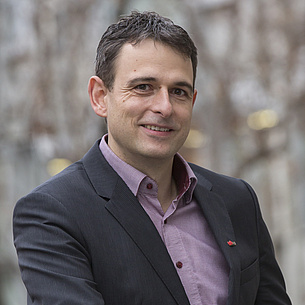- Duration of study: 6 semesters
- ECTS credit points: 180
- Academic degree: Bachelor of Science (BSc)
- Language of instruction: German,
many courses offered in English.
The Bachelor's Programme
In the bachelor's degree programme, you will be prepared to enter the broad field of computer science and receive the knowledge and basic education you need to work in the complex domain of information technologies. You will deal with the fundamentals of and technologies and applications used in systematic and automated information processing.
In addition, you will learn methods and tools that you can use to understand complex systems in the natural sciences, technology and other areas of human life. You have the opportunity to specialise in subject areas such as software engineering, artificial intelligence, machine learning, computer vision, or security. This programme enables you to apply logical thinking skills and solve analytical problems, as well as express your creativity and innovation.
During your studies you will have a chance to experience the tangible connection between theory and practice. You will learn more about current topics, such as artificial intelligence (AI), big data, the Internet of Things, game development, IT security, machine learning, VR (virtual reality). Furthermore, you will carry out smaller software projects or have the opportunity to work on a research project as part of your bachelor’s thesis.
Studying Computer Science
In this degree programme, you have the opportunity to specialise in the following areas:
Fundamentals: You will learn the fundamentals of computer science, how to work with data structures and algorithms, as well as mathematical foundations of computer science, e.g. analysis, discrete mathematics, numerical computing, linear algebra, probability theory and statistics.
Programming: You will learn more about topics such as systems programming, programming languages, operating system basics and software paradigms.
Information Processing: Your research interests will include data management, cryptography and computer security.
Artificial Intelligence: You will learn the fundamentals of artificial intelligence and machine learning.
Human Computer Interaction and Visual Computing: You will be working on human computer interaction, ethical issues, computer vision and computer graphics.
What will I have to do in the first semesters? How much practice can I expect? And what can I actually do with my degree when I've finished? Check what you expect!
Colleagues from the faculty will take time for you and your questions online:
To the Discord server of the Faculty of Computer Science and Biomedical Engineering
Contact: lse@tugraz.at
Computer science is omnipresent and is becoming steadily more important. From cell phones to airplanes and from washing machines to medical equipment - IT is everywhere. Computer scientists conduct research to learn how information technologies can be used to improve everyday human life.
Smart production, the statistical analysis of large amounts of data, e-mobility, BCI (brain-computer interface), artificial intelligence, autonomous drones, robotics, or cyber-security just some of the areas in which new trails are being blazed and important social issues and challenges of the future are being addressed.
The Faculty of Computer Science and Biomedical Engineering has not only demonstrated its success in the academic field: Teachers and students from the faculty have founded more than 30 companies that employ over 1000 people.

The field of IT security is a hugely dynamic topic. Therefore, in the bachelor's programmes, we teach current and practical topics that are related to the structure and security of computers, operating systems and networks, as well as fundamental topics. At the same time, there is a student team called LosFuzzys, which participates in Capture-The-Flag-Events (CTF Events) worldwide and offers training sessions for newcomers.
By joining various student teams, you can network with other students outside of your regular studies and work on IT topics such as the:
Admission
Requirements for admission to a bachelor's degree programme at TU Graz
Summer semester 2026
Admission period: 7 January to 5 February 2026
Winter semester 2026/27
Admission period: 6 July to 5 September 2026
Contact study@tugraz.at
Perspectives for Graduates
Information technologies have increased in importance significantly and rapidly in recent years. They have been introduced into practically all aspects of science, economy and society. The fields of activity of computer scientists are correspondingly broad. They are in demand as
- IT specialists,
- data scientists,
- researchers, as well as
- software developers.
Occupational fields can be found in industry as well as in the service sector, and in public administration as well as in teaching and research.
Graduates of the Bachelor's Degree Programme Computer Science are also qualified to apply for further master's degree programmes at the highest level.
After completing the bachelor's degree programme, you can enrol in the following master’s degree programmes without further requirements:
- Computational Social Systems
- Computer Science
- Software Engineering and Management
- Information and Computer Engineering
- Data Science
Information on other master's degree programmes with requirements you can find on the respective pages for the master’s degree programmes.
In addition, the bachelor's degree offers you the opportunity to apply internationally for master's degree programmes.




